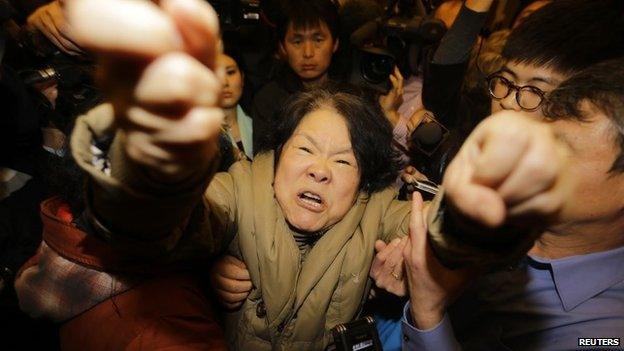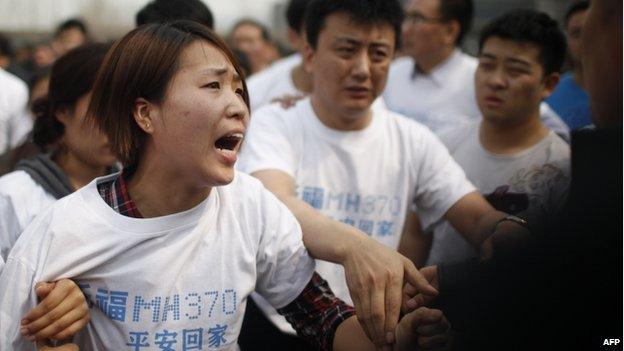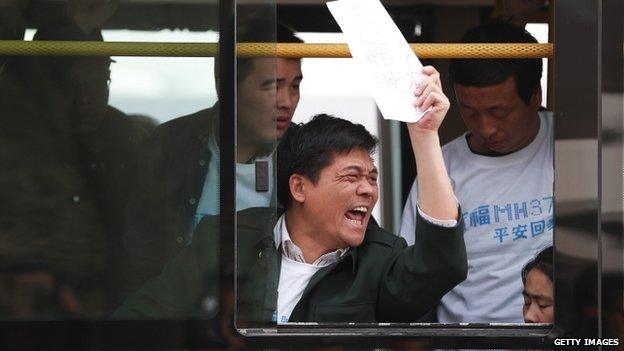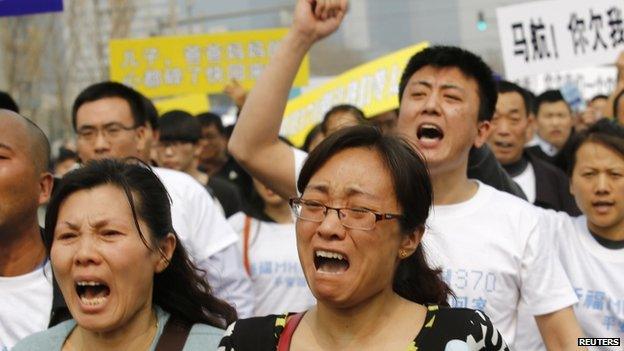Will China tolerate families' Malaysia plane protest?
- Published

Relatives of the missing passengers have been waiting for more than two weeks for news of their loved ones
It was a dramatic day for the Chinese families of those aboard the missing plane. After days of waiting at a Beijing hotel for information, they have become increasingly angry and frustrated with the Malaysian authorities.
They feel that, all along, the Malaysian government, military and airline officials have hidden information about the search for their relatives.
The vast majority of the family members believe their parents, sisters, brothers and children are still alive, somewhere.
Monday's announcement from the Malaysian prime minister appears to have pushed the families past the boiling point.
Why would the Malaysians give up hope for the search before locating the plane, they asked.
On Tuesday, the families showed they were not willing to wait patiently for answers any longer.
Critical of Beijing
They organised themselves into an effective pressure group, pushing past Chinese police lines multiple times and launching a rare public march on the streets of Beijing.
Yelling "We want the truth!" and "The Malaysians are murderers!", they reached the embassy in less than an hour.

Relatives vented their anger outside the Malaysian embassy in Beijing
The protest yielded some results. Shortly after they were bussed back to the hotel where they have camped for the past two weeks, the families met with the Malaysian ambassador and several relatively high-ranking Chinese officials from the central government.
But notably, the families also seem to become more critical of Beijing.
At the start of the meeting, the BBC has learnt, a representative of the family group told the other relatives that they were not strong enough to demand answers from the Malaysians on their own. They needed their own government, the Communist leadership in Beijing, to support them.
A few minutes later, several high-ranking Chinese officials arrived in the meeting room, the deputy secretary of the State Council and the deputy transportation minister among them.

The protesters were taken back to the hotel where they are staying for a meeting with officials
After delivering brief speeches, the Chinese delegation got up to leave, but they were quickly shouted down by the families.
"We need our government to work for us," shouted some of the relatives. "The Chinese and Malaysian governments are the same. They're all corrupt."
Others leapt to the Chinese government's defence: "Long live Chairman Xi," they yelled, referring to Chinese President Xi Jinping.
The ruckus continued when the Malaysian ambassador arrived at the meeting, two independent sources have confirmed to the BBC. He was cursed by the Chinese relatives and many questions were shouted in his direction.
At one point, we are told, the Malaysian ambassador wanted to leave, but the Chinese families wanted to force him to stay with them.
The Chinese authorities intervened to allow the ambassador to leave the meeting room, to the disgust of some of the relatives.
Little patience
If anger continues to build against the Chinese leadership, the families could be entering very dangerous territory.
In the past, the Communist authorities tolerated mild protests by groups who had been publicly wronged, including parents whose children were sickened by tainted milk formula or families who lost children when their schools collapsed during the 2008 Sichuan earthquake.

Malaysia Airlines flight MH370 was carrying a total of 239 people, including 153 Chinese nationals
However, in both of those instances, Beijing's patience for those groups quickly ended once the families organised and began issuing demands.
Chinese police are now preventing journalists from meeting family members inside the Beijing hotel where the relatives receive their daily briefings - an ominous sign that the government will not accept any more public protests.